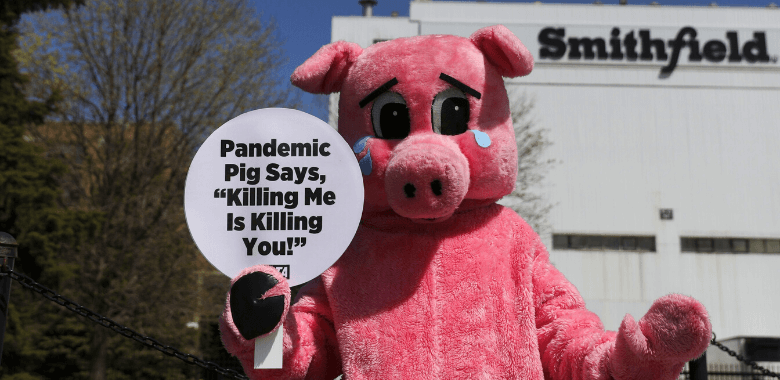New Flu With Pandemic Potential Found in Pigs—Have We Learned Nothing?
It seems that 2020 really wants to teach us a lesson on the deadly outcomes of slaughtering animals. Scientists recently identified a new flu virus with the potential to cause a pandemic. The source? Pigs killed for their flesh.
This new strain of flu is carried by pigs but can infect humans, according to a recent study published in the scientific journal Proceedings of the National Academy of Sciences.
The virus—labeled G4 EA H1N1—has derived from the 2009 swine flu that caused the first global flu pandemic in 40 years. Scientists wrote that G4 viruses have “all the essential hallmarks of a candidate pandemic virus.”
While the scientists who wrote the study recommended that we closely monitor pigs and people who raise and kill them for their flesh, we have a better idea: Learn from COVID-19, raging forest fires, apocalyptic climate change, and the undeniable epidemics of obesity, heart disease, and cancer and just stop eating animals already.

PETA’s was one of the first voices to make a public call for the World Health Organization to close wet markets. Not long afterward, more than 60 legislators called for the same thing. Since then, we’ve been protesting the live-animal markets and slaughterhouses in New York City, where cases of COVID-19 have spiked. Our “Pandemic Pig” has even hoofed it around markets and grocery stores, handing out toilet paper and reminding shoppers to avoid meat like the plague.
It’s not a matter of if using and killing animals for food will give rise to another disease outbreak—it’s a matter of when.
Mad cow disease, swine flu, avian flu, SARS, HIV, hoof-and-mouth disease, and other zoonotic diseases have all stemmed from capturing or farming animals. The novel coronavirus may have originated in a Chinese live-animal market—but when it comes to spawning dangerous pathogens, animal markets and slaughterhouses are one and the same the world over.
For years now, scientists have warned that filthy farms crammed full of sick animals are breeding grounds for new, antibiotic-resistant “superbugs.” Some claim that by 2050, more people will be dying of antibiotic-resistant diseases than of cancer.
The United Nations found that 70% of new human diseases originated in animals and that many of those were directly linked to animals used for food.

We’ll be better off as a species once we start viewing pigs as fellow living beings who love to play games and cuddle their babies—and chickens as the caring mothers they are. Like many other animals, cows have best friends, can solve critical-thinking problems, and enjoy the company of kind humans.
All animals value their lives and will do whatever they can to live free from harm. Once we finally acknowledge the complex lives of animals, we’ll be saving not only them but also ourselves.
PETA urges everyone to go vegan—right here, right now.
Order a free vegan starter kit. We have all the resources necessary to support folks who want to ditch meat, eggs, and dairy. You can make a real difference and save nearly 200 animals a year—simply by not eating them!

